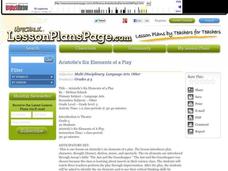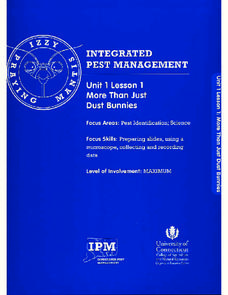Curated OER
Writing Out Loud: Poems for Two Voices
Helpful ways for poetry to reinforce your lesson - for any subject.
Captain Planet Foundation
Energy Flow in the Garden
How can you tell what an owl has eaten? Study the food chain and flow of energy in an ecosystem by dissecting an owl pellet and noting the bones found inside. Additionally, the lesson includes a game about consumers and producers with a...
Curated OER
Plant Parts and their Function
Discover why plants are important to our world. View plant parts and categorize them as stems or buds. Students do a cut and paste of pictures of plants into correct categories. Students also plant a carrot top,and record the growth and...
Curated OER
Exploration of 'pill bugs'
Fifth graders define words. They create a dichotomous key. After carefully examining pill bugs, 5th graders record observations. They compare and contrast habitats of pillbugs.
Education Outside
Creature Jeopardy!
After conducting research on a given scientific animal name, group members take a walk around their school and look for the specified animals in that classification. Then, they come back to their worksheets and create five creative clues...
Curated OER
A Monster of a Metaphor
What do Jeep advertisements and Steinbeck's The Grapes of Wrath have in common? They both employ the art of the extended metaphor! Using the Six-Trait Writing model, learners begin to work on their own extended metaphors. Development...
Chicago Botanic Garden
Leaf Litter Ecology Lab
Some organisms spend their entire lives in leaf litter. The third in a series of six is a great lesson exploring the community of leaf litter. Groups gather and then spread leaf litter over white paper and remove leaves/twigs while...
Education Outside
Honey Tasting
Young scientists will be abuzz as they sample and compare the tasty treats produced by Apis Mellifera.
Curated OER
Aristotle's Six Elements Of A Play
Fifth graders view the play, The Ant and the Grasshopper. They define Aristotle's six elements of a play. At the end of the lesson plan, 5th graders be asked to participate in the play by acting like busy ants. This lesson plan would tie...
Curated OER
Wildlife Variety Show: Biodiversity In Illinois
Eighth graders write a short report in first person about any plant or animal found on a list of Illinois species. They become the character of the plant or animal and give a short report describing the plant or animal.
Curated OER
Japan: Farmers Face Global Competition
Students examine the history of Japanese farming and current international farming issues. They conduct Internet research, create a chart to illustrate the history of farm products in Japan, and simulate a WTO meeting.
Curated OER
School Forest
Sixth graders explore the concept of biodiversity. In this biodiversity lesson, 6th graders discover a variety of planets and animals that live in forests, and how a rotting log benefits that environment. Students also locate seven...
K12 Reader
Rainforest Ecosystems
Rainforests are the topic of this brief reading passage. Learners can find out all about the different layers of the rainforest as well as the types of creatures that live there. After reading, they respond to five questions about the text.
K12 Reader
What’s Eating You?
Introduce your class to producers, consumers, and pollinators with a reading passage. Class members read the text and respond to five related questions.
Curated OER
Exploration of "Pillbugs"
Fifth graders define vocabulary terms, identify the characteristics of a pillbug, and create a dichotomous key. Then they examine the pillbugs and make observations and record these observations. Finally, 5th graders observe specific...
Curated OER
"Ing" Words as Descriptors
This clever instructional activity has your students listen to story about bugs, work together to brainstorm list of "ing" words that describe bugs, create t-chart of words, choose words to place in poem template to create class poem...
Curated OER
Habitat Assessment
Third graders demonstrate the effects of varying environmental components on plants and animals: chemical, physical and biological characteristics of a habitat. They find chemical, physical and biological characteristics of the lake at...
University of Connecticut
More Than Just Dust Bunnies
Teenagers will never complain about cleaning their rooms after this activity. In the first lesson of a four-part series, budding scientists collect samples of dust, chalk, and other particulates from various areas of the classroom. They...
Curated OER
Pond Ecology
A lab activity is a great way to incite thoughtful questioning and scientific processes. Pupils will collect organisms with a Petri dish, make observations, sketch the organism, ask questions, then attempt to identify the specimen...
Curated OER
Activities in A Science Classroom
Learning Through Games and Activities Make Staying On Task in the Classroom Fun
California Academy of Science
Composting: A Scientific Investigation: California Academy of Sciences
Garbage, recycle, compost: Does it really matter where we put our trash once we are done? By making detailed observations over seven weeks, kids will see which materials break down naturally to become a healthy part of the soil, and...
K12 Reader
Coyote: The Survivor of North America
Coyotes in Chicago? Yip. Middle schoolers demonstrate their ability to identify details that support the idea that coyotes are adaptable creatures.
Michigan State University
In Search of Life
Explore the habitats around you with an activity that takes kids out of the classroom to learn about the local variety of habitats and the living things that call them home. In small groups, scholars investigate their surroundings,...
Curated OER
Introduction to Adaptation
Tenth graders observe collections of specimens and discuss their answers to provided questions. They explore common ancestry, homology, analogy, adaptive radiation, and evolution, while formulating creative answers based on their...

























